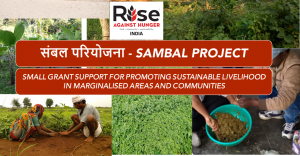Empowering Communities to achieve food security is a major focus area of Rise Against Hunger India. Towards this, micro-level community-based projects are implemented in partnership with local grassroots organizations for a sustained period of time. On World Food Day October 16, a major initiative was launched by Rise Against Hunger India to reach some of the most vulnerable, food insecure pockets of India. This initiative, known as SAMBAL (Resource Base), will focus on rural households in selected Districts for livelihood and food security efforts.  
Several geographical clusters, comprising of a group of Aspirational Districts (formerly known as most backward districts) have been identified for Rise Against Hunger India’s long term program interventions. Fifty-four parameters across categories such as Population demographics, Infant and Young Child Feeding, Disease Burden, Pre-Natal and Delivery Care, Post-Natal and Early Childhood Care, Water, Sanitation and Hygiene, Food Security, Socio Economic Conditions were applied to come out with the listing of districts – which can also be called the hunger hotspots of India. A total of 32 such districts in 8 clusters – mostly in inter-state border areas – have been identified and in the first phase, this initiative is being planned in 3 clusters as mentioned below:
- Cluster 1- Malkangiri (OD), Koraput (OD), Nabrangpur (OD), Bastar (CH), Dantewada (CH), Vizianagaram (AP),
- Cluster 2-Godda (JH), Dumka (JH), Sahibganj (JH), Pakur (JH), Banka (BI), Jamui (BI), Birbhum (WB),
- Clsuter 3 – Dhar (MP), Barwani (MP), Nandurbar (MH), Narmada (GJ)
(OD – Odisha, CH- Chhattisgarh, AP – Andhra Pradesh, BI – Bihar, WB – West Bengal, MP – Madhya Pradesh, JH – Jharkhand, MH – Maharashtra and GJ – Gujrat).
 For the first phase, requests for proposals and concept notes from grassroots organizations are being invited for implementation of SAMBAL project in these clusters.  Detailed guidelines including eligibility criteria and online application form are available here. Given below is a brief summary of the eligibility criteria:
For the first phase, requests for proposals and concept notes from grassroots organizations are being invited for implementation of SAMBAL project in these clusters.  Detailed guidelines including eligibility criteria and online application form are available here. Given below is a brief summary of the eligibility criteria:
- Applicant organization must be registered as a Trust, Society, Cooperative or FPO
- Annual Turnover from all sources must be less than 25 lakhs (2.5 million rupees) per annum
- Willing to work on a small grant support program
- Must be registered in the region for which it is applying and must have a presence of at least 3 years in the cluster
- Must have a functional Board (must have met regularly for the past 2 years
Timeline:
- Last date of submission – December 10, 2020 (extended the deadline due to request from some organizations)
- First scrutiny and review – December 12, 2020
- Notification and contact with the short-listed applicants – December 20,
2020 - Budget finalization and MOU signing for the selected projects – January 10,
2021 - Project launch – January 12, 2021
The application form is very simple, and it is easy to fill-in. So any organization that fits the eligibility criteria, can read through the questions and provide responses without needing any external support. Once the basic concepts are accepted, Rise Against Hunger India team will work on the detailed proposal and budget. So, if you are an organization working in any of the clusters listed above, or know of any grassroots group working there, you can simply go ahead and complete the application form. Â
 "
"